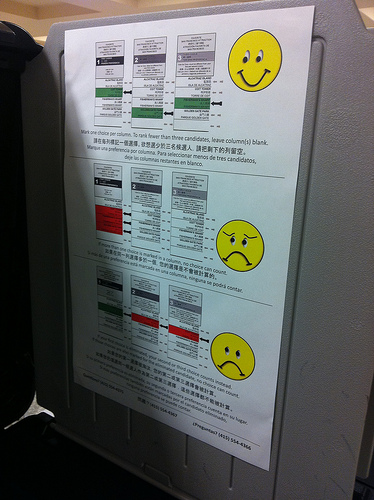On the same day that San Francisco voters were deciding who would be the next mayor, the method used to elect that person was under attack.
At a Board of Supervisors meeting on Tuesday, Supervisor Mark Farrell introduced a charter amendment for the June 2012 ballot that would eliminate ranked-choice voting as a way of elevating candidates to city offices.
“Ranked-choice voting is an experiment whose unintended consequences continue to pile up election after election,” Farrell said.
Supervisor John Avalos, himself a mayoral candidate, said that he had asked City Attorney Dennis Herrera – yet another mayoral hopeful – to evaluate the efficacy of the system. He pointed out that since city voters approved doing away with the “winner-take-all” system in 2002, they re-elected then-Mayor Gavin Newsom and several other city officials without objection.
Avalos also called into question the timing of the measure’s introduction on Election Day. He also predicted a signature-gathering effort to put it the ballot if the board rejects the measure.
“I think it smacks of rabid zealousness,” he said.
Under ranked-choice voting, voters may select up to three candidates in order of preference. If no candidate receives more than 50 percent of the vote an immediate runoff occurs where the candidate with the fewest votes are eliminated and the voter’s next choices are redistributed among the remaining office-seekers until one passes the 50 percent threshold.
Last year, ranked-choice voting decided Oakland’s mayoral. Jean Quan defeated Assemblyman Don Perata after trailing in the first count of votes.
Supervisor Sean Elsbernd, who backs Farrell’s proposal, said the system is responsible for nine out of the 11 supervisors being elected without a clear majority from the outset – including Farrell, who overcame a first-round deficit to Janet Reilly last year to win the District 2 seat.
Elsbernd, who won his District 7 seat in 2004 under ranked-choice voting, also said the system is undemocratic and was problematic in this year’s mayoral race.
“I guarantee whoever is elected in today’s mayor race will receive less than a majority of votes,” he said.
The board could decide next month if the measure appears on next year’s ballot. Supervisor Scott Wiener, an ally of Farrell and Elsbernd, hinted at voting against the proposal in the meeting.
“I don’t think it’s the right way to go,” Wiener said. “But I don’t think it’s inappropriate to raise the issue.”










